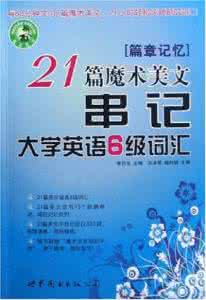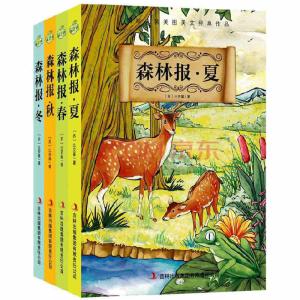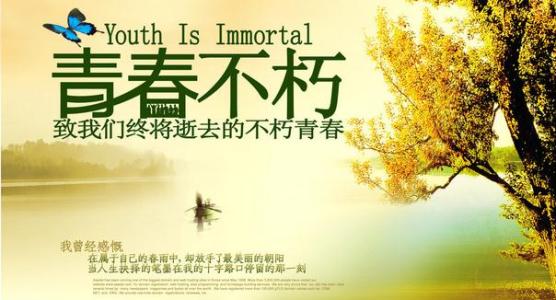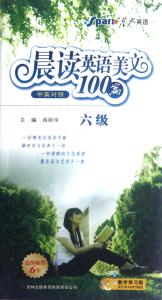如何使学生的书面表达化难为易?可以从英语中的经典美文入手:指导观察打好写好书面表达的基础,从中获得写好书面表达的兴趣,继而模仿操练,学会修改,使书面表达规范优美。下面是小编带来的英文晨读美文,欢迎阅读!
英文晨读美文篇一
年轻时代的三个阶段Three periods of my youth
About the twelfth year of my age, my father being abroad, my mother reproved me for some misconduct, to which I made an undutiful reply. And The next first-day, as I was with my father returning from meeting, he told me that he understood I had behaved amiss to my mother, and advised me to be more careful in future. I knew myself blamable, and in shame and confusion remained silent. Being thus awakened to a sense of my wickedness, I felt remorse in my mind, and on getting home I retired and prayed to the Lord to forgive me, and I do not remember that I ever afterwards spoke unhandsomely to either of my parents, however foolish in some other things.
我12岁那年,父亲出差国外,母亲因为我的过错屡加责备,我因此也常常顶撞。刚满玲岁那天,我和开会归来的父亲待在一起,他告诉我,他知道我对母亲出言不逊,建议我今后做事要更加认真小心。我知道自己应该受到责罚羞愧难当,不知所措,沉默不语。意识到曾经对母亲所做出的种种不敬于了为,我内心充满懊悔,回到家,我缩到一旁,向上帝祈祷,希望得到宽恕;这件事情之后,在我的记忆中,不管我在做其他事情时怎么愚蠢,但再没有以柴鹜小驯的口气和父亲或者母亲说话。
Having attained the age of sixteen , I began to love wanton company and though I was preserved from profane language or scandalous conduct, still I perceived a plant in me which produced much wild grapes; my merciful Father did not, however, forsake me utterly, but at times, through his grace, I was brought seriously to consider my ways; and the sight of my backslidings affected me with sorrow, yet for want of rightly attending to the reproofs of instruction, vanity was added to vanity, and repentance to repentance. Upon the whole, my mind became more and more alienated from the truth, and I hastened toward destruction. While I meditate on the gulf towards which I travelled, and reflect on my youthful disobedience,my heart is affected with sorrow.
16岁的时候,我开始结交朋友,与其为伴;虽然我不讲脏话,也不做诽谤他人的事。但是我心中仍然有一棵树苗,结出了许多野葡萄。然而,我仁慈的父亲并没有彻底地放弃我,他以身为范,而且时不时地让我感知恩赐。我得以严肃地反省自己的种种行径;一想起自己的态意妄为,我就满心悲伤:为了正确而用心地对待父母的教诲,我的虚荣心日益膨胀,悔意俱增。总之,我的内心日益远离真理,我很快崩溃了,当我在旅游观光的海湾沉思之际,回想起自己年少时的叛逆轻狂,悲伤涌上心头。
Thus time passed on; my heart was replenished with mirth and wantonness, while pleasing scenes of vanity were presented to my imagination, till I attained the age of eighteen years, near which time I felt the judgments of God in my soul, like a consuming fire, and looking over my past life the prospect was moving. I was often sad, and longed to be delivered from those vanities; then again my heart was strongly inclined to them, and there was in me a sore conflict. At times I turned to folly, and then again sorrow and confusion took hold of me. In a while I resolved totally to leave off some of my vanities, but there was a secret reserve in my heart of the more refined part of them, and I was not low enough to find true peace. Thus for some months I had great troubles and Thus quite; there were meany on unsubjected, which rendered my labors fruitless. At length, through the merciful continuance of heavenly visitations, I was made to bow down in spirit before the most time. I remember One evening I had spent some time in reading a pious author, and walking out alone I humbly prayed to the Lord for his help, that I might be delivered from all those vanities which so ensnared me. Thus being brought low, he helped me, and as I learned to bear the cross I felt refreshment to come from his presence, but not keeping in that strength which gave victory I lost ground again, the sense of which greatly affected me. and I sought deserts and lonely places, and there with tears did confess my sins to God and humbly craved his help. And I may say with reverence, he was near to me in my troubles, and in those times of humiliation opened my ear to discipline.
光阴往再,每当我幻想着逍遥无度的时光,内心就充满了欢愉,直到1岁时.我才感到上帝的审判在我心中有如一团燃烧的火焰,审视着我过往的岁月,这种景象一直伴随着我。我常常伤心痛苦,希望从这些虚荣自负的情境中得以解脱;而我的心则再一次强烈地受到牵引,内心充满了痛苦的情感冲突。有时我会干些傻事,悲伤和困惑就会再次牵绊着我。偶尔,我会下定决心抛弃虚荣心,但是内心有个隐秘的仓库,储存着更多久经考验的自负情绪,我不够谦卑,无法找寻到真正的祥和宁静。几经数月,我面临重重困难,难以静心,心中有一股倔强的意志,使得我所有的付出都化作枉然,直到最后,上大祸福不断,我才得以从精神上屈从于万能的上帝。我记得有天晚上我花了点时间阅读了一位虔诚的作者的作品,之后独自漫步庭外,我谦恭地向上帝寻求指点,这样我才能从深受困扰的虚荣心中得以解脱。因此,在我失去财富与地位时。上帝帮助了我;在我学会背负苦难时,我感觉在上帝面前获得重生:但是因为没有保持带来胜利的力量,我再一次失去了支点,这种感觉深深地折磨着我;我要求接受惩罚,井寻找人迹罕至之地,在那里,我泪流满面地向上帝忏悔自己的种种罪过,卑微地祈求上帝的帮助。现在,我可以满怀敬意地说,当我身陷困境时,上帝就在我身边,还使我留心在那些遭受羞辱的日子里所接受的教海。
英文晨读美文篇二
老年的悲剧The tragedy of old age
What is it like to be old in the United States? What will our own lives be like when we are old? Americans find it difficult to think about old age until they are propelled into the midst of it by their own aging and that of relatives and friends. Aging is the neglected stepchild of the human life cycle. Though we have begun to examine the socially taboo subjects of dying and death, we have leaped over that long period of time preceding death known as old age. In truth, it is easier to manage the problems of death than the problem of living as an old person. Death is a dramatic, one-time crisis while old age is a day-by-day and year-by-year confrontation with powerful external forces, a bittersweet coming to terms with one's own personality and one's life.
在美国,人老了会是什么样?当我们年迈时,生活会是什么样的呢?美国人很难考虑到老年问题,直到自己或是亲朋好友开始变老,他们才被迫面对这些问题。在人的一生中,老年就像继子一样被人忽视。虽然我们开始研究这些被社会视为禁忌的有关生老病死的话题,但我们往往跳过了那一段被称作“老年”的最终走向死亡的长长的日子。事实上,死亡问题比老年人的生活问题要容易应对得多。死亡是一次意义重大而转瞬即逝的危机,而老年却是一场日夜不息地与强大外在力量对抗的斗争,是一段苦乐参半、与自身性格和生命相妥协的过程。

Old age is neither inherently miserable nor inherently sublime-like every stage of life it has problems, joys, fears and potentials. The process of aging and eventual death must ultimately be accepted as the natural progression of the life cycle, the old completing their prescribed life spans and making way for the young. Much that is unique in old age in fact derives from the reality of aging and the imminence of death. The old must clarify and find use for what they have attained in a lifetime of learning and adapting they must conserve strength and resources where necessary and adjust creatively to those changes and losses that occur as part of the aging experience. The elderly have the potential for qualities of human reflection and observation which can only come from having lived an entire life span. There is a lifetime accumulation of personality and experience which is available to be used and enjoyed.
老年从本质上讲既不悲惨,也不崇高——就像生命中的任何阶段一样,老年也有矛盾、欢乐、恐惧和希望。人们最终必须懂得,老年足一个渐渐老去直至死亡的过程,是生命中的自然阶段,是老人击完上帝所赐予的生命旅程并为年轻人铺平前进道路的阶段。老年之所以独特,是冈为人要逐渐变老并时刻面临死亡的威胁。老年人一定要搞清楚他们经过一生的学习和适应所获得的经验知识,并将它们用到实处;老年人必须保存力量和智慧,创造性地去适应某些在老年阶段所必然发生的变化和观察,也只有当他们那走完整个人生。他们才能具备这种能力,那是一种经过一生酌积累所形成的成熟经验和特有品质。
But what are an individual’s chances for a “good ” old age in America, with satisfying final years and a dignified death ?Unfortunately , none too good. For many elderly Americans old age is a tragedy, a period of quiet despair, deprivation , desolation and muted rage. This can be a consequence of the kind of life a person has led in younger years and the problems in his or her relationships with others. There are also inevitable personal and physical losses to be sustained, some of which can become overwhelming and unbearable. All of this is the individual factor, the existential element. But old age is frequently a tragedy even when the early years have been fulfilling and people seemingly have everything going for them. Herein lies what I consider to be the genuine tragedy of old age in America—we have shaped a society which is extremely harsh to live in when one is old. The tragedy of old age is not the fact that each of us must grow old and die but that the process of doing so has been made unnecessarily and at times excruciatingly painful, humiliating, debilitating and isolating through insensitivity, ignorance and poverty. The potentials for satisfactions and even triumphs in late life are real and vastly under explored. For the most part the elderly struggle to exist in an inhospitable world.
但是在美国,一个人能够满足地安享晚年并安然逝去的机会有多大呢?非常不幸,答案是微乎其微。对于许多美国人而言,老年是一场悲剧,是一个充满了默默的绝望、失落、孤独和无言的愤怒的阶段。这是他们在年轻时的生活方式和与他人交往所产生的矛盾造成的必然结果。老年人还不可避免地遭受身体和精神上的损失,其中有些损失足以令老人不堪忍受和承受。这些都是个人因素,真切存在着的因素。但是,对于一年在年轻时成就非凡、拥有一切的人们而言,老年依然是一场悲剧。因此我认为,在美国,老年人的真正悲剧在于——我们已经形成了一个老人极其难以生存的社会。老年的悲剧并不在于人们必然变老和死亡的事实,而在于老人在这个过程中由于麻木、无知和贫困而要时常遭受难以忍受的痛苦、屈辱、衰弱和孤独,因此老年阶段在人们心目中变得没有必要。晚年生活是有可能令人满足和骄傲的,只是不为人所开发而已。大多数老年人还是在一个毫不友善的世界中艰难地生存着。
英文晨读美文篇三
论读书Of studies
Studies serve for delight, for ornament, and for ability. Their chief use for delight, is in privateness and retiring; for ornament, is in discourse; and for ability, is in the judgement and disposition of business. For ecpert and execute, and perhaps judge of particulars, one by one; but the general counsels, and the plots and marshalling of affairs, come best form those that are learned. To spend too much time in studies is sloth; to use them too much for ornament, is affectation; to make judgement wholly by their rules, is the humour of a scholar. They perfect nature, and are perfectec by experience: for natural abilities are like natural plants, that need proyning by study; and studies themselves do give forth directions too much at large, except they be bounded in by experience. Crafty men contemn studies, simple men admire them, and wise men use them; for they teach not their own use; but that is a wisdom without them, and above them, won by observation.Read not to contradict and confute; nor to believe and take for granted; nor to find talk and discourse; but to weigh and consider. Some books are to be tasted, others to be swallowed, and some few to be chewed and digested; that is, some books are to be read only in parts; others to be read, but not curiously; and some few to be read wholly, and with diligence and attention. Some books also may be read by deputy, and extracts made of them by others; but that would be only in the less important arguments, and the meaner sort of books; else distilled books are, like common distilled waters, flashy things.
读书可以怡情,足以傅彩,足以长才。其怡情也,最见于独处幽居之时;其傅彩也,最见于高谈阔论之中;其长才也,最见于处世判事之际。练达之上虽能分别处理细事或一一判别枝节,然综观统筹,全局策划,则非好学深思者莫属。读书费时过多易惰,文采藻饰太盛则矫,全凭条纹断事乃学究故态口读书补天然之不足,经验又补读书之不足,盖天生才华犹如自然花草,读书然后知如何修剪移接;而书中所示,如不以经验范之,则又大而无当。有一技之长者鄙读书,无知者慕读书,唯明智之十用读书,然书并不以用处告人,用书之智不在书中,而在书外,全凭观察得之。读书时不可存心诘难作者,不可尽信书上所言,亦不可只为寻章摘句,而应推敲细思。书有可浅尝者,有可吞食者,少数则须细读,读时须全神贯注,孜孜不倦。书亦可请人代读,取其所作摘要,但只限题材较次或价值不高者,否则书经提炼犹如水经蒸馏,淡则无味矣。
Reading maketh a full man; conference a ready man; and writing an exact man. And therefore, if a man write little, he had need have a great memory; if he confer little, he had need have a present wit; and if he read little, he had need have much cunning, to seem to know that he doth not. Histories make men wise; poets witty; the mathematics subtile; natural philosophy deep; moral grave; logic and rhetoric able to contend. Abeunt studia in morse. Nay there is no stand or impendiment in the wit, but may be wrought out by fit studies: like as diseases of the body may have appropriate exercises. Bowling is good for the stone and reins; shooting for the lungs and breast; gentle walking for the stomach; riding for the head; and the like. So if a man's wit be wandering, let him study the mathematics; for in demonstrations, if his wit be called away never so little, he must begin again. If his wit be not apt to distinguish or find differences, let him study the schoolmen; for they are cymini sectores. If he be not apt to beat over matters, and to call up one thing to prove and illustrate another, let him study the lawyers'cases. So every defectof the mind may have a special receipt.
读书使人充实,讨论使人机智,笔记使人准确。因此不常作笔记者须记忆特强,不常讨论者须天生聪颖,不常读书者须欺世有术,始青色无知而显有知。读史使人明智,读诗使人灵秀,数学使人周密,科学使人深刻,伦理学使人庄重,逻辑修辞之学使人善辩;凡有所学,皆成性格。人之才智但有滞碍,尤不可读适当之书使之顺畅,一如身体百病,皆可借相宜之运动除之。滚球利睾肾,射箭利胸肺,漫步利肠胃,骑术剩头脑,诸如此类。如智力不集中,可令读数学,盖演题须全神贯注,稍有分散即须蕈演;如不能辩异,可令读经院哲学,盖是辈皆吹毛求疵之人;如不善求同,不善以一物阐证另一物,可令读律师之案卷。如此头脑巾凡有缺陷,皆有特药可医。(王佐良译)
 爱华网
爱华网



